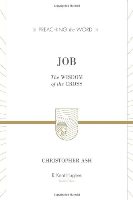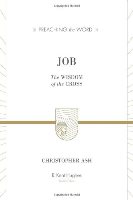Today we continue our interview with Christopher Ash of Proclamation Trust regarding his sermon commentary on the book of Job. If you missed the first part of this interview, you can catch up here.
Books at a Glance (Fred Zaspel):
Near the end of the book God finally speaks. How does this serve as a fitting climax to the rounds of speeches that we have heard through the book?
Ash:
God’s two magnificent speeches are rightly regarded as climactic and wonderful. Perhaps a key question is how the second speech is related to the first, and indeed why the second is necessary after the wonder of the first. The first focusses on the wild parts of the Created Order and stresses that the Creator alone controls and directs all that goes on in these parts, parts that are so obviously beyond and outside anything that Job can hope to understand or control.
The key to understanding the second speech is the challenge of 40:6-14, in which God asks whether Job has the authority to judge the world. The supernatural beasts that follow (Behemoth and Leviathan) are most probably vivid story-book descriptions of death and the one who has the power of death, that is, the devil. The second speech is not simply a postscript to the first, but adds in the seriously superior claim that God is sovereign even over the supernatural forces of evil, that is, the devil himself and all his domain. It is this final claim that makes Job say at the end, “I know you can do all things, and that no purpose of yours can be thwarted” (42:2).
 Books at a Glance:
Books at a Glance:
Near the end of the book Job speaks. What is the significance – for Job and for us – of what he has to say?
Ash:
Yes, Job speaks in 42:1-6. It is worth noting two things. First, about Job. Job’s comforters say that Job is suffering because he has sinned and not repented. They are wrong (e.g. 22:5; 42:7). Job is blameless and upright; he fears God and turns away from evil (1:1,8; 2:3). But – and this is the other side of Job – Job does sin in some of what he says; his suffering is not caused by previous sin, but it does result in some sin. It is of this that he repents (42:1-6). He has suggested that he knows better than God how to run the world. In my book I quote some words attributed to a medieval king of Spain: “Had I been present at the creation, I would have given some useful hints for the better ordering of the universe.” Job has spoken a little like this and God rebukes him. He must not, and we must not, suggest that we know better than God.
The second thing to notice is that Job acknowledges that God “can do all things” (42:2); he really is sovereign. In the context of the book, and of the Leviathan chapter before (Job 41) and as we saw in the previous question, this means that Job finally grasps that God is so great that he can and does control even supernatural evil in his good government of the world. This is truly remarkable. Evil is not an independent and hostile power battling against God; the devil is – in Luther’s vivid phrase – “God’s Satan”, and yet without God himself being tainted by evil. What a great God, to use even evil to work his purposes!
Books at a Glance:
How is the end of the story – Job’s restoration and blessing – significant?
Ash:
Yes, Job is doubly blessed at the end. What are we to make of this? In James chapter 5, writing to suffering Christians, James encourages us to wait patiently for the return of the Lord Jesus. In support of this he says we have seen the perseverance of Job (James 5:7-11). This New Testament control means we must read the end of Job as foreshadowing the end of all things, when Jesus returns, and not before. Job is not an implicit promise that if we suffer for a while in this life God will bless us even more greatly in this life; he may, or he may not. But we can be sure that when Jesus returns we shall be vindicated and blessed beyond measure; the final blessings to Job picture this for us.
Books at a Glance:
One challenge for preachers who wish to work through the book of Job is that it is such a long book – it will take a while! And in fact some of the speeches in the book are themselves very long and therefore difficult to handle in a single sermon. Can you give some general advice to preachers regarding how to handle the book? How many sermons have you taken to preach through Job? For that matter, early in your commentary you draw some observations from the very obvious fact that Job is such a big book. Can you put all this into perspective for us?
Ash:
Ah, yes, it is long; and it is mostly poetry. We need time and space to feel it and enter into it through the poetry; we must resist the temptation to skim it, to abbreviate it, to reduce it to an SMS or a Tweet. I first preached 7 sermons on it, and wished I had made it 10. I think 10 would be a good number. Perhaps a couple to get the story started (to cover chapters 1-3), then one to sample one of the comforters’ speeches (perhaps chapter 8), a couple to sample Job’s speeches (perhaps chapter 9 and then chapter 19, for example), one to consider Job’s summing up speeches (especially chapters 29-31), one from Elihu’s speeches (chapters 32-37), one or two from the Lord’s final speeches, and a concluding one on chapter 42. Something like that. This will tell the story but also help us feel some of the big themes of the book. There are no rules about this, of course. There is no prohibition on preaching a short series! It is just that it is hard even to begin to do justice to the book. But I am not suggesting that mega-long series are wise; if you preach 42 sermons, many of your people will never get to grips with John’s gospel, Romans, or Isaiah!
Books at a Glance:
Do you have any other new book in the works that we can keep a lookout for?
Ash:
I have several waiting to be written! I hope, God willing, to continue to contribute to the Proclamation Trust resource series for preachers and bible teachers, and to write Teaching John’s Gospel, Teaching the Psalms, and Teaching Esther. And I have agreed to contribute a couple of volumes to the Good Book Company’s excellent new series on Questions Christians Ask on Is God really in control? and Does prayer work? I have other ideas as well, but we shall have to see if God gives time and strength to write them all! Thank you for your encouragement.

